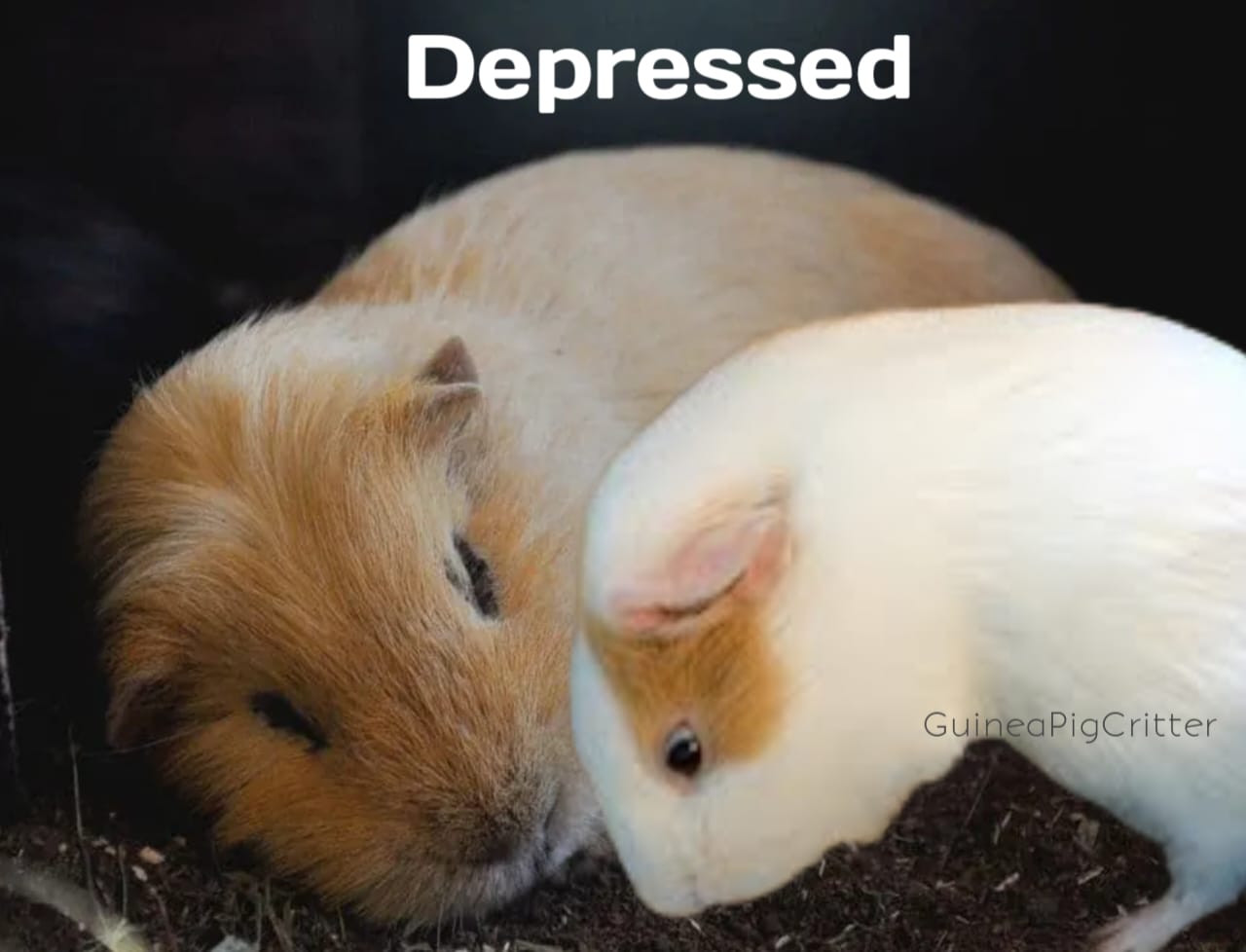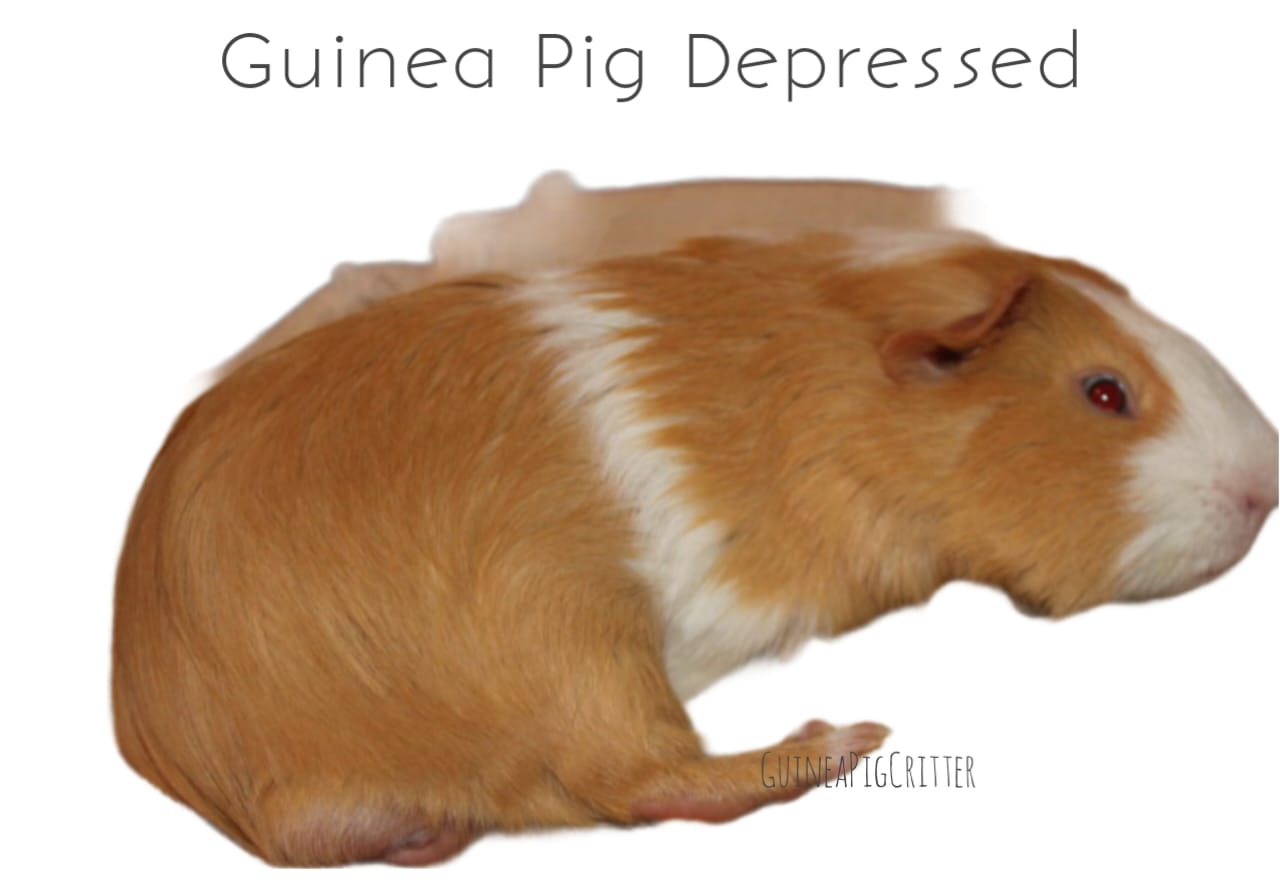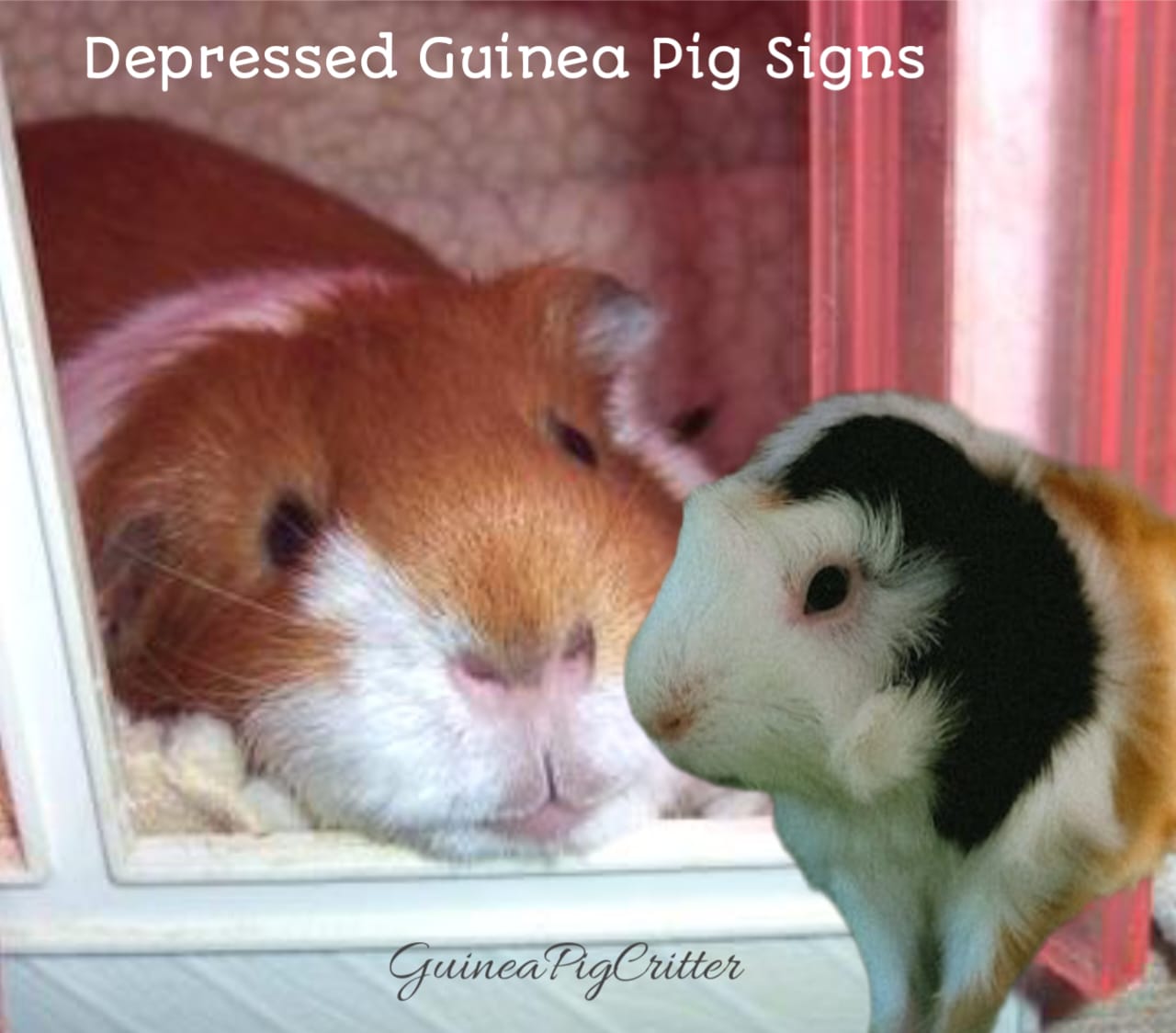Guinea pigs, or cavies, are highly vivacious and caring pets that many families love. They are much adored friends because of their playfulness and sociable nature. Nonetheless, guinea pigs like any other animal may become emotionally distressed and depressed which has an impact on their overall wellbeing and health.
Hence, it is important to understand and address depression in guinea pigs for them to live happy lives. It will discuss signs of depression in guinea pig, how it can be diagnosed and treated, as well as ways to prevent its occurrence.
Read also :-can mice eat guinea pig food?
Understanding guinea pig depression
Depression in guinea pigs is a condition of emotional distress that may be expressed through various behavioral changes as well as physical ones. Guinea pigs being unable to express themselves like humans underscores the need for pet owners to be watchful about even slight indicators of pain. Depression in guinea pigs can develop from a number of things such as change in environment, lack of socialization, sicknesses among others.
Causes of Depression in Guinea Pigs
Environmental Changes
Guinea pigs are habitual animals, and sudden shifts in their surroundings cause stress to them. This may involve moving to a new residence, rearranging the cage or introducing new pets or people into the home. Even slight alterations such as using different bedding material can disrupt their sense of well-being leading to stress and depression.
Loneliness
Guinea pigs are social creatures that also thrive in the company of other guinea pigs. Loneliness or loss of a companion can lead to emotional distress. Keeping Guinea pigs alone may result in feelings of isolation especially if it was used to being with another casemate. Their mental state is deeply affected by this death or absence of a mate.
Sickness
Health problems can cause emotional distress in guinea pigs as well. Medical issues like dental diseases, gastrointestinal disorders; infections among others could influence their mood and behavior. Illness often manifests through changes in eating habits, levels of activity and demeanor overall. It is important to distinguish between physical illness and depression because they call for distinct therapeutic approaches.
Lack of mental stimulation
Guinea pigs are naturally inquisitive and energetic creatures that necessitate psychological and physical activity to be happy. The absence of toys, play options or possibilities for exploration may cause boredom that can transform into depression if left unattended. Keeping an environment that is interesting and stimulating for your guinea pig is crucial in preventing boredom-related illnesses.
Signs of depression in guinea pigs
Consequently, identifying depression in guinea pigs involves noting alterations in their habits, eating patterns, grooming rituals and general condition. The following are some typical indications which can show whether a depression condition among your guinea pig:
Appetite Changes
Reduced feeding: one of the most visible symptoms of clinical depression is poor appetite. In case the animal eats less than usual or becomes reluctant towards meals, it indicates emotional suffering. This might lead to reduction of weight as well as lower levels of energy.
Increased feeding: on the other hand, some depressed guinea pigs may consume more food than ever before. This can contribute to obesity among other health conditions.
Water consumption changes: the animal’s mood disorder also affects its intake of water. A decline or increase in the quantity of fluid they take implies stress or ill health.

Changed Behavior
Withdrawal from interaction: a guinea pig that is typically sociable and engaging may pull back when it is depressed. This can be seen as reluctance to interact with humans or other guinea pigs, concealing more frequently, and disregarding social contact entirely.
Decreased activity levels: depression can cause a significant decrease in the level of physical activities. A guinea pig which once thrilled at exploring its surroundings and playing might become less energetic and less inclined towards any kind of physical movement.
Grooming changes
Poor grooming: depression may make a guinea pig to abandon its grooming practices. This may result in an untidy appearance characterized by matted fur and overall uncleanliness.
Excessive grooming: some guinea pigs may over-groom as a way of coping. This can lead to skin irritation, hair loss, and general deterioration in health status.
Altered vocalization
Lack of normal sounds: Guinea pigs are well-known for their vocalizations such as squeaks, purrs, chirps among others. Reduced amounts of these sounds could indicate that your Guinea pig is feeling sad or unwell.
Increased vocalization: on the contrary some depressed guinea pigs become more talkative or crybaby due to being upset about their condition. Vocalizing more than usual could be their way of expressing discomfort or misery.
Posture changes
Slumped posture: a guinea pig that is slumped or takes up a slumped posture might be undergoing emotional and physical suffering. This stance may signal agony, tension, or simply feel not in place.
Lethargy: an unwillingness to move along with being generally less energetic can mean depression is developing. Guinea pigs that are not participating in their usual activities may be downhearted.
Sleeping patterns
Excessive sleeping: if your guinea pig is excessively sleeping particularly when it should usually be active, this could mean depression. Increased sleep helps them evade distress or anxiety.
Restlessness: difficulty in sleeping or signs of restlessness may also suggest that an animal is going through emotional pain. If you find your guinea pig unable to settle down or relax, it might have anxiety or depression.
Diagnosing depression in guinea pigs
Diagnosing whether a guinea pig has depression is something that needs careful observation and sometimes professional input.
Monitor for any changes in behavior
Keep an eye on your guinea pig’s behavior closely. By comparing this with the usual activity of the pet, it is possible to identify patterns or changes in the animal. Check also if the observed differences are consistent and persistent, which might imply depression rather than a temporary problem.
Consult a vet
You need to consult a veterinary doctor if you notice continual differences in conduct as well as physical manifestations. A professional can examine your guinea pig thoroughly, perform diagnostic tests and help ascertain whether any underlying health conditions are causing distress to your rodent. Also vets can suggest what steps you should take next in terms of therapy.
Consider factors that could be responsible for changes in mood
Take into account anything new like other pets, change of abode or something such simple like variation from their usual routine. Such environmental aspects may alleviate the symptoms associated with depression.
Ways to address and manage depression among guinea pigs
When you realize that your pet has become depressed, it is imperative that you take some action to help them recover. Here are few ways to help your guinea pig recover:
Enrichment of the environment
Introduce toys and activities: Have different types of toys and activities that can mentally and physically engage your guinea pig. Chew toys, tunnels, climbing structures can keep them busy and focused.
Create a cozy home: Guinea pigs require a clean living area that is comfortable with hiding areas for security purposes. A well-organized habitat with soft beddings and enough space to move around in would lessen anxiety levels improving their disposition.
Dietary aspects
Supply a balanced diet: Make sure that your guinea pig eats a well-balanced diet. High quality hay, fresh vegetables, and fruits are critical for their well-being. A healthy regimen contributes to physical wellness while influencing the mood positively.
Give them fresh rewards: Once in a while bring into their diet new fruits or vegetables as treats. Fresh treats, if nourishing can be enriching to them and improve their psychological state. Stay away from foods which have high calcium content or sugar as they may cause ill health conditions.
Medical aspect
Routine examination: Regular veterinary check-ups should be done so that you monitor how healthy your guinea pig is doing. Regular visits help in early detection and treatment of health issues before they become severe.
Ensure addressing health issues: if diagnosed with any health problems by a veterinary doctor, follow their recommendations on treatment and nursing. Your guinea pig’s overall well-being can be improved by treating the underlying health issues as well as alleviating symptoms of depression.
Behavior modification
Stepwise alterations: just take gradual steps while adjusting your guinea pig’s environment. Introducing new things at once can be stressful hence making it difficult for your guinea pig to adjust.
Increase socializing time: have some quality interactions with your guinea pig. Being gentle to them, speaking to them or playing with them can make you feel happier and let you develop closer relations. For emotional welfare, these creatures need regular interaction amongst themselves.
Preventing Guinea Pig Depression
Preventing depression is all about having a stable and stimulating environment for your guinea pig. Here are some methods of preventing depression:
Stable Environment
Consistency: Keep an unvaried living place so that there is minimal stress. Don’t change the environment or routine often because this may heighten anxiety levels in the animal. This way, they will feel safe and secure.
Conducive living space: ensure that your guinea pig’s cage or living area is spacious, clean, and well-ventilated. When a habitat is comfortable and maintained in good condition this contributes to the overall welfare of the animals.
Socialization
Companionship: Guinea pigs are friendly animals that like to live in pairs or small groups. They enjoy company of others and it is good for them to have other guinea pigs around them, which eases loneliness among them and promotes their psychological well-being.
Regular interaction: One should spend time with the guinea pig as much as possible on a daily basis. By engaging in play, grooming and gentle handling they develop a positive relationship with their owner and prevents loneliness as well as depression.
Mental and physical stimulation
Variety of toys: You can give your guinea pig different kinds of toys that help to stimulate its mind. To avoid boredom, move these toys around regularly.
Exploration opportunities: Try letting your guinea pig out of its cage so it can explore. Such supervised playtime gives mental stimulation and exercise for the pet.

Health maintenance
Regular veterinary visits: Every once in a while take your guinea pig for check-ups at the vet’s office. It helps in avoiding serious health conditions when discovered early before they affect your pet’s mood.
Balanced diet: Offer a diet that is balanced and full of vitamins and minerals. This improves physical healthfulness whereas mental well-being can also be enhanced accordingly by providing proper nutrition.
Read this :-Can guinea pigs and humans live together?
Conclusion
Keeping an eye out for depression in guinea pigs and treating it is essential to their well-being in general. Knowing the symptoms of depression, identifying possible causes, and using appropriate treatments can help your guinea pig live happily and healthily.
Providing a stable environment with lots of things to do, taking them for regular check-ups and getting involved with other animals are key to keeping the pet from being depressed or having emotional health issues. It’s only attentive care and understanding that will see you through any challenges you encounter, thereby ensuring that your beloved guinea pig thrives.


